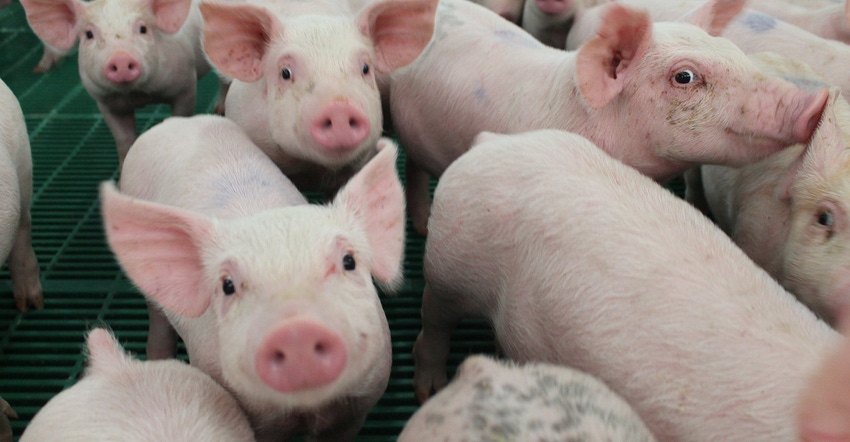Autogenous vaccines: A tool in the toolbox
Autogenous vaccines are a useful tool because they can be a solution when other solutions have failed.
January 23, 2020

It's that time of year filled with snow, ice and … minimum ventilation inside your barn. The time of year when it is a constant battle between fresh, good air quality versus the heating bill. Poor air quality can also lead to increased bacterial disease pressure such as Streptococcus suis and Haemophilus parasuis in nursery pigs.
We all know the challenges of treating these infections, and many ask about vaccines or other ways to prevent these. One tool your veterinarian may employ for a constant disease issue when other strategies have failed is an autogenous vaccine.
What is an autogenous vaccine?
An autogenous vaccine is custom made for a specific producer or group of animals. This vaccine is a killed vaccine and needs to be made by a veterinarian. The efficacy (how well it works) does not need to be proven with an autogenous vaccine. Efficacy studies take a large amount of time and money to perform. This type of testing is required to have a commercially licensed vaccine but is impractical and defeats the purpose of an autogenous vaccine.
Autogenous vaccines used to be commonly made in veterinary clinics, however, there was always a question about the sterility of these processes since there were limited testing procedures; after all, these are veterinary clinics and not vaccine laboratories. Many different samples, people, etc., may enter and exit a veterinary clinic on a regular basis, so there was always a risk of contamination in the vaccine with an unintended pathogen.
Traditionally, Pipestone Veterinary Services was hesitant to recommend an autogenous vaccine to a client due to the issues listed above. Today, we are utilizing autogenous vaccines more frequently. What's changed?
Trusted manufacturers have bought autogenous vaccine companies and have implemented the same rigorous protocols used in their commercial production platforms.
New disease challenges.
Pressure to reduce antibiotic usage.
Recent research through Pipestone Applied Research to prove their benefit.
What is the process to get an autogenous vaccine?
A disease is identified or other interventions have been ineffective
A veterinarian collects samples and submits to a diagnostic laboratory
The diagnostic lab determines the cause and isolates the pathogen
The isolates are forwarded to an autogenous vaccine company
The autogenous company grows the bacteria or virus in the lab
A vaccine is developed and quality control testing is performed
The vaccine is shipped to the customer
This entire process can take anywhere from six to 12 weeks, so an autogenous vaccine cannot be used as an immediate intervention for a disease problem happening today.
When are autogenous vaccines considered?
Autogenous vaccines are a useful tool because they can be a solution when other solutions have failed. A common scenario for their use is when a commercial vaccine for that disease does not exist. A few pathogens without a current commercial vaccine include Mycoplasma hyosynoviae, Streptococcus suis, Actinobacillus suis and Teschovirus.
Another common scenario is when current commercial vaccines are ineffective. Because an autogenous vaccine is made specifically for the farm, it can include a different strain or serotype that is not contained in the commercial vaccine. This may be an option for pathogens such as influenza, Haemophilus parasuis, E. coli, rotavirus, etc.
What are challenges with autogenous vaccines?
I cannot stress enough that these should only be used with proper diagnostics. The cause of the disease needs to be identified and verified that the isolated pathogen is actually causing the disease. Let's use Strep. suis as an example. Strep suis has more than 35 different types with multiple types being present in the pig and environment that are not causing disease.
If proper diagnostics are not performed and the Strep. suis that does not cause disease is isolated and used for a vaccine, the vaccine will not protect against the Strep. suis strain that is actually causing the disease. Therefore, the time and money used to make this vaccine would have been wasted.
Other challenges include the time needed to make the vaccine (six to 12 weeks), possible minimum dosage order requirements, the need to administer two doses, and no guarantee that the vaccine will work. Due to these challenges, other treatment and prevention avenues should be evaluated before creating an autogenous vaccine.
Hopefully, this has provided some insight into what an autogenous vaccine is, and what they can offer. Autogenous vaccines are not always a silver bullet but another tool in the toolbox. If you are struggling with recurrent disease issues where all other solutions seem to fail, talk to your veterinarian to see if an autogenous vaccine might be the right fit for your farm.
Source: Evan Koep, who is solely responsible for the information provided, and wholly owns the information. Informa Business Media and all its subsidiaries are not responsible for any of the content contained in this information asset.
You May Also Like



